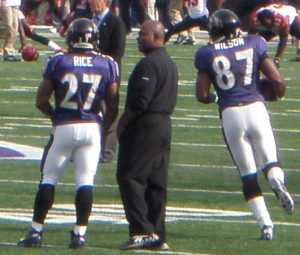8 Gender-Based Violence
Sarena Henry
Since 1991 the United Nations have run a campaign each year from November 25 (International Day Against Violence Towards Women) to December 10 (International Human Rights Day) called 16 Days of Activism (Global 16 Days Campaign n.d). In 2018, players of the Women’s National Basketball League team, the Bendigo Spirit, wore orange jerseys during a game to promote this campaign (Bendigo Spirit, 2019). 16 Days of Activism aims to raise awareness about gender-based violence (GBV); individuals around the world can participate in the campaign through the creation of tools that pressure governments to eliminate gender-based violence against women. In 1991 Vienna recognized violence against women as a violation of human rights because of 16 Days of Activism .
Gender-Based Violence in Canada
Before discussing gender-based violence, it is important to note the difference between gender and sex. Sex refers to physiological and biological characteristics that describe female, male, and intersex persons, while gender refers to the behaviours and roles associated with being male or female. These roles are determined by society and can change over time and differ between cultures. GBV is when people experience violence due to their gender, gender identity, gender expression, or perceived gender (Government of Canada, 2020). GBV is not just physical action, it occurs in our everyday language, jokes, and other common actions, for instance, as in comments that demean the LGBTQ+ community in social media. Society has historically placed rigid gender roles and norms on young children to follow as they age. This can negatively impact their health, social, and economic means throughout life. These long-lasting effects can pass down into other generations leading to cycles of abuse and violence within families or even communities. Although violence can affect everyone, certain populations are more at risk of experiencing GBV including women and girls, members of LGBTQ+ communities, Indigenous women and girls, non-binary peoples, and women with disabilities. Many Canadians are unaware of how common GBV is.

Why is this an important issue? According to the Canadian Women’s Foundation, a woman is killed approximately every six days by her intimate partner and children who see violence at home experience twice the rate of psychiatric disorders compared to those from non-violent homes (“Gender Based Violence in Canada | Learn the Facts,” n.d.). Statistics Canada (2019) released a survey about safety in public and private spaces that found one in three women experience unwanted sexual behaviour in a public setting and women are more likely to report experiencing violence such as online harassment, sexual assault, or unwanted sexual behaviour in the workplace. These alarming statistics stress the need for society to become more aware of this problem to create change.
Last year, the federal government invested over $80 million in 80+ projects that prevent GBV as well as support groups and professionals who respond to this social issue (Canada, 2019). The government also announced revisions to the Criminal Code including increasing the maximum sentence for repeat offenders of intimate partner violence and updating the current definition of intimate partners to include current or former spouses, dating partners, and common-law partners. These are two examples of actions the government has taken that benefit individuals who have already experienced GBV. But, there are few preventative measures in place to stop GBV from occurring. I believe sometimes in order to create change we must put a stop to the issue before it can even happen, for instance by focusing our efforts on young children. We need future generations not to think GBV is normal and acceptable. One way to do this is by having strong examples in media such as television shows, movies, and sports that show GBV as inappropriate and immoral regardless the situation, and discuss the negative health, social, and economic effects it can cause.
Influences on Gender-Based Violence
One of the larger questions in this societal issue is why does this violence occur so frequently? There is no question society has placed expectations on gender in terms of roles and characteristics you are allowed to portray, including which sport people of a certain gender should play. If I were to ask you which sports are considered feminine would your answer include gymnastics, figure skating, and dance? Those are the first three examples that come to mind for me and interestingly these sports are considered non-aggressive. Of course, there are also sports that are common among both genders such as soccer and tennis, which are still not very aggressive and are typically low contact as compared to some other sports. Sport is a clear example of how society influences which genders can portray certain characteristics as “women’s” sports are often less aggressive and require an element of grace and elegance that typical “men’s” sports lack. With these gender roles in place, there’s no question women are seen as less physical than men and like they need to be held at a lower athletic level in the sporting context. Many youths participate in sport and may transfer this way of thinking into their everyday lives, which may lead to viewing women as lesser and easy targets for violence.

A report by the Media Technology Monitor found 77% of Canadians watch professional sports and 60% of those viewers watch the major sport leagues such as the NHL, CFL, MLB, and NBA (Rody, 2017). That’s over three quarters of Canada’s population watching professional sports which display aggressive behaviours towards other athletes for entertainment purposes. I think since these behaviours are given a green light in sport some may see them as a green light for non-sporting contexts as well. Now sport is not to blame for GBV, but I do believe major professional sports may be a contributing factor in normalizing violent behaviours in media. Media has such a big influence on society’s views and can indicate what people are supposed to feel towards a particular topic. Another example of normalizing violent behaviours is the TV show Game of Thrones. In the show women were used as objects for pleasure and more often than not ended up getting killed as a result. Now I understand this is a fictional show set long before our time, but it had a following like no other HBO show. CNBC stated the show had close to 17.4 million viewers for the first episode of the final season (Whitten, 2019). Could violent TV shows like Game of Thrones be influencing viewers to think violence is acceptable and appropriate, especially towards women?
It is clear society and media both influence each other to make people think women can be seen as less than compared to men. It is the cultural norm that men are the stronger gender and hold a position of power that is untouchable by women. Sports is a clear example of men dominating women as the major sport leagues such as NFL, NHL, and MLB do not have female counterparts. When men are encouraged to think they hold more power than women, there is no question why gender-based violence occurs. We have to call out the media for portraying small, weak, and powerless women, because women are not weak, and they should not be targets for violence solely because of their gender.
Gender-Based Violence in Sport
Many professional athletes have been accused of sexual assault or domestic violence. Kobe Bryant was accused of a sexual assault that took place back in 2003 with a 19-year-old employee of a hotel, and he faced a felony charge of assault (Pells, 2020). The case was eventually dropped and settled outside of court but did not affect his public image. Another athlete who was charged with sexual assault back in 2009 and who paid out a settlement was Cristiano Ronaldo (Grinberg, 2019). Ronaldo also has one of the most followed accounts on Instagram with over 100 million followers and he is one of the most well-known soccer players today. Considering his large following, he is in a position of power and influence with his fans. He has a known history of violent behaviour towards women, yet he still has a positive public image. Before researching GBV in sport, I was not aware of the allegations against these high-profile athletes. It seems these allegations do not have the same impact as they do for political leaders, new anchors, or movie producers. Why are athletes able to avoid major repercussions when other high-profile figures are scrutinized?

This question most likely has multiple answers; however, I think one of the main reasons lies within the major sport organizations’ policies. Interestingly, the NBA and MLB have joint domestic violence/abuse policies in their collective bargaining agreements while the NFL and NHL have nothing of this sort (Neal, 2018). Both the NHL and NFL have broad disciplinary procedures for athletes, and it is left up to the Commissioner of the league to enact discipline. The NFL has had many players charged with domestic violence and the most notable is Ray Rice. Back in 2014 Ray Rice of the Baltimore Ravens knocked out his fiancé in an Atlantic City casino and was suspended for two games. This is a shorter suspension compared to other players who faced drug violations and is an arguably greater offence that was even captured on video. The NFL has a history of minimizing domestic violence or violence against women in the media to keep their best athletes playing on the field despite allegations against them. Major sport leagues are first and foremost a business, which means they want the revenue that comes from ads, ticket sales, and deals with cable companies. They cannot afford bad press or images from their athletes which might take away from this revenue. For public relations on teams, it is easier to protect their players, reduce the attention on the incident by denying any violence took place. As sport fans, it is up to us to stop turning a blind eye and start calling out the organizations to make a change with their policies towards GBV. We must hold high-profile athletes and their leagues accountable for their actions the same way we do other high-profile figures.
Our society needs to change cultural norms and encourage everyone to create preventative measures towards GBV. This includes strong role-model behaviour in children’s programs, media portraying women equal to men, and calling out high-profile figures for GBV. Together we can create change and make a positive impact for women’s equality.
References
About the 16 Days of Activism Campaign. Global 16 Days Campaign. https://16dayscampaign.org/about-the-campaign/.
Canada, W. and G. E. (2019, August 7). Government of Canada Highlights Progress on Gender-Based Violence [News releases]. Gcnws. https://www.canada.ca/en/status-women/news/2019/08/government-of-canada-highlights-progress-on-gender-based-violence.html
Gender Based Violence in Canada | Learn the Facts. (n.d.). Canadian Women’s Foundation. Retrieved November 15, 2020, from https://canadianwomen.org/the-facts/gender-based-violence/
Government of Canada, S. of W. C. (2020). About Gender-Based Violence. https://cfc-swc.gc.ca/violence/knowledge-connaissance/about-apropos-en.html
Grinberg, E. (2019, August 20). Cristiano Ronaldo admits paying $375,000 to settle sexual assault claim in 2010—CNN. https://www.cnn.com/2019/08/19/us/cristiano-ronaldo-las-vegas-settlement/index.html
McCann, M. (2019, July 15). The WNBA and issues surrounding domestic abuse. Sports Illustrated. https://www.si.com/wnba/2019/07/15/wnba-domestic-violence-sparks-storm-riquna-williams-natasha-howard
Neal. (2018, August 24). Which of the Big 4 Has the Best Domestic Violence Policy? Grandstand Central. https://grandstandcentral.com/2018/society/best-domestic-violence-policy-sports/
Pells, E. (2020, January 28). Kobe Bryant was just one among many athletes to skirt sexual assault allegations in the #MeToo era | The Independent | The Independent. https://www.independent.co.uk/sport/us-sport/nba/kobe-bryant-rape-case-sexual-assault-allegation-cristiano-ronaldo-metoo-a9305836.html
Rody, B. (2017, July 22). Nearly one third of Canadians watch sports every day: Study. https://mediaincanada.com/2017/06/22/nearly-one-third-of-canadians-watch-sports-every-day-study/
Spirit players jump behind 16 days of Activism Against Gender-Based Violence. (2019, November 29). Bendigo Spirit. https://wnbl.basketball/bendigo/news/spirit-players-jump-behind-16-days-of-activism-against-gender-based-violence/.
Statistics Canada. (2019, December 5). Gender-based violence and unwanted sexual behaviour in Canada, 2018: Initial findings from the Survey of Safety in Public and Private Spaces. The Daily. https://www150.statcan.gc.ca/n1/daily-quotidien/191205/dq191205b-eng.htm.
Whitten, S. (2019, April 15). “Game of Thrones” hits record viewership in season 8 premiere. https://www.cnbc.com/2019/04/15/game-of-thrones-hits-record-viewership-in-season-8-premiere.html
Images
DMCA. Back of woman and man’s fist. Pxfuel. https://www.pxfuel.com/en/free-photo-xtygd.
DMCA. Young man watching football sport on tv at home. Pikrepo. https://www.pikrepo.com/fytib/young-man-watching-football-sport-on-tv-at-home.
1ravenscowboysnflfan. (2011). Ray Rice, Wilbert Montgomery, and Kris Wilson of the Baltimore Ravens before a game against the Cincinnati Bengals. WikiMedia Commons. https://commons.wikimedia.org/wiki/File:Ray_Rice_and_Kris_Wilson.jpg.

